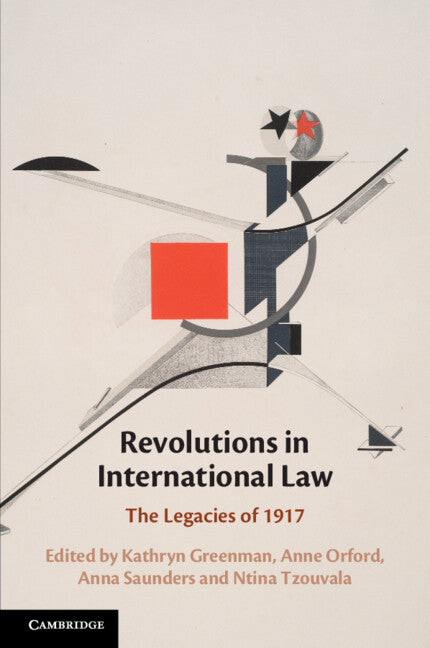Freshly Printed - allow 8 days lead
Couldn't load pickup availability
Revolutions in International Law
The Legacies of 1917
The 1917 October Revolution and the revolutionary Mexican Constitution shook the foundations of international law. This collection revisits their legacies.
Kathryn Greenman (Edited by), Anne Orford (Edited by), Anna Saunders (Edited by), Ntina Tzouvala (Edited by)
9781108816847, Cambridge University Press
Paperback / softback, published 3 November 2022
444 pages
22.9 x 15.2 x 2.3 cm, 0.641 kg
'This volume is a rich and innovative work that advances our understanding of the role of 1917 in shaping international law and interrogates law as a factor of both radical transformation and maintenance of the status-quo. It will surely serve to push forward new research agendas …' Raluca Grosescu, Journal of the History of International Law
In 1917, the October Revolution and the adoption of the revolutionary Mexican Constitution shook the foundations of the international order in profound, unprecedented and lasting ways. These events posed fundamental challenges to international law, unsettling foundational concepts of property, statehood and non-intervention, and indeed the very nature of law itself. This collection asks what we might learn about international law from analysing how its various sub-fields have remembered, forgotten, imagined, incorporated, rejected or sought to manage the revolutions of 1917. It shows that those revolutions had wide-ranging repercussions for the development of laws relating to the use of force, intervention, human rights, investment, alien protection and state responsibility, and for the global economy subsequently enabled by international law and overseen by international institutions. The varied legacies of 1917 play an ongoing role in shaping political struggle in the form of international law.
1. International law and revolution: 1917 and beyond Kathryn Greenman, Anne Orford, Ntina Tzouvala and Anna Saunders
Part I. Imperialism: 2. Looking eastwards: the Bolshevik theory of imperialism and international law Ntina Tzouvala and Robert Knox
3. Lenin at Nuremberg: anti-imperialism and the juridification of crimes against humanity Amanda Alexander
Part II. Institutions and Orders: 4. Excluding revolutionary states: Mexico, Russia and the League of Nations Alison Duxbury
5. Law, class struggle and nervous breakdowns Mai Taha
6. Microcosm: Soviet constitutional internationality Scott Newton
7. Law and socialist revolution: early Soviet legal theory and practice Owen Taylor
Part III. Intervention: 8. Intervention: sketches from the scenes of the Mexican and Russian Revolutions Dino Kritsiotis
9. Mexican revolutionary constituencies and the Latin American critique of US intervention Juan Pablo Scarfi
10. Mexican post-revolutionary foreign policy and the Spanish Civil War: legal struggles over intervention at the League of Nations Fabia Fernandes Carvalho Veçoso
Part IV. Investment: 11. 1917: property, revolution and rejection in international law Kate Miles
12. 1917 and its implications for the law of expropriation Daria Davitti
13. Contestations over legal authority: the Lena Goldfields Arbitration 1930 Andrea Leiter
14. The Mexican Revolution: alien protection and international economic order Kathryn Greenman
Part V. Rights: 15. 'Animated by the European spirit': European human rights as counterrevolutionary legality Anna Saunders
16. Human Rights, revolution and the 'good society': the Soviet Union and the Universal Declaration of Human Rights Jessica Whyte.
Subject Areas: International human rights law [LBBR], Public international law [LBB], International law [LB], Legal history [LAZ], Law [L], Human rights [JPVH]


